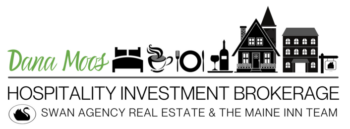Browse my Maine Inns, Maine Restaurants, Maine Event Venues
and other Maine Commercial Listings for Sale
People always ask...
Why are there are a lot of inns on the market in Maine?
First, there are a LOT of inns in Maine, and for good reason, tourism is hot and one of our top industries! But at any given time, during various up and down times of our economy, there are always a number of Maine inns for sale. Over the last 15 years, it’s been common for me to have 15+/- listings at any given time. Some were on the market prior to the recession and then pulled them off. Then some went back on around the same time, when the economy began to pick up. There really is no absolute cycle.
And think about this: if an inn owner does not have another house to which they can move if they sell, the housing market at present time (2023) isn’t favorable for them to find a home, and in many cases, unless they buy without a financing contingency, they are often competing with cash buyers, so it makes it a much more challenging time for a future seller to list. This is likely contributing to the low inventory.
And since Covid, just like in residential sales, we saw such a boom that we sold more inventory than we have listed.
NOW, there is very little inventory from which to choose. I do have some new listings coming soon. Stay tuned!
And why are they selling?
FIRST: Did you know that without a seller’s permission, agents cannot disclose the motivation for selling. The same with the buyer, an agent can’t disclose a buyer’s motivation to purchase without permission.
But typically there is no ‘secret’. The most common reason is to spend more time with children and grandchildren, followed by just time to retire. Innkeeping is a pre-retirement job, but it is not retirement! We first bought our inn when I was 38. Guests would come in and immediately after I’d say “welcome, I’m your innkeeper Dana”, they’d respond “You’re the owner? You’re too young to be retired”! And I would just laugh…
Innkeeping is not retirement. It’s a transitional job before retirement that provides a wonderful lifestyle allowing you to work from home, often with a partner, enjoy the tax benefits, grow your business investment and operate until you are ready to sell or actually retire.
Now that breakfast is over, what do you do the rest of the day?!!
Now this is my favorite question. I would joke and respond “I eat bon-bons!”.
What I will tell you is that a great innkeeper makes it look easy. What goes on behind the scenes to provide a smooth guest experience is key. But more on that later. Or during one of our seminars!
Definitions
The lodging industry in itself is very much a lifestyle. Travel and tourism is a lifestyle. And incorporating the ownership of a lodging property, regardless of financial performance, can be referred to as ‘lifestyle’. We represent sellers of a variety of distinctive lodging styles such as bed and breakfasts, rental cabins and cottages, boutique hotels and motels. And quite often we see properties that have a combination of the various types units which can often be very desirable as they offer something for everyone. In general, we refer to this as a lifestyle business. And this lifestyle business can take place in a variety of property types. And just because something is considered a ‘lifestyle business’, it doesn’t mean it can’t also be viable or feasible.
We refer to the financial side of this lifestyle business with some key terms you should understand (you should also check out my Top 12 Blog Posts as most are financial related):
“Financially Viable” means inns that generate enough income to cover operating expenses, mortgage, real estate taxes and some amount of owner’s compensation. Everyone’s definition of what is a sufficient owner’s compensation is different. Always remember there are tax benefits from being an inn owner/operator. For more information on that subject, check out my blog post.
“Feasible” means properties with a size and location that have the realistic potential to become financially viable. They may include unique hospitality properties that are under-performing (for health, personal choice or other reasons), closed, distressed, or currently used for other purposes. Often these properties have the upside potential a buyer is looking for, but it might mean the buyer has to put a larger downpayment on the purchase to make the cash flow work until they are able to get the revenue up.
“Lifestyle” means inns and B&B’s whose smaller size and revenues may not generate sufficient income to cover operating expenses, mortgage, real estate taxes. These inns are operated by owners who wish to enjoy the lifestyle of running a bed & breakfast without totally relying upon the business’s revenues. Often owners of an inn in this category have other means of income. This could be a pension, investments, retirement funds, social security, etc. Or maybe one partner works outside the inn.

